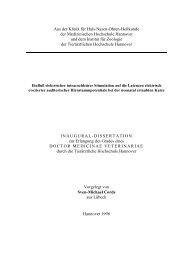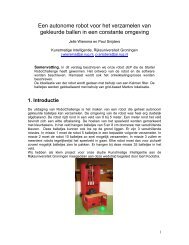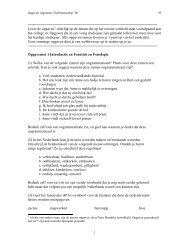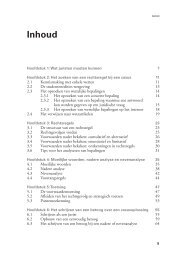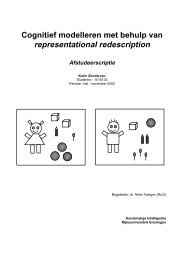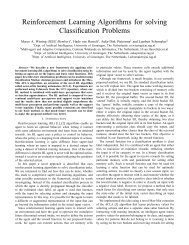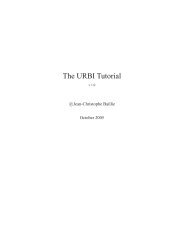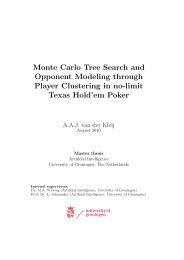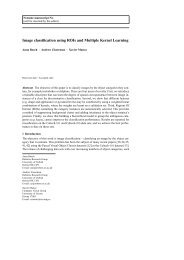Presuppositions in Spoken Discourse
Presuppositions in Spoken Discourse
Presuppositions in Spoken Discourse
You also want an ePaper? Increase the reach of your titles
YUMPU automatically turns print PDFs into web optimized ePapers that Google loves.
Chapter 2<br />
2.5 briefly outl<strong>in</strong>es several variations of the b<strong>in</strong>d<strong>in</strong>g theory that are quite<br />
important. These <strong>in</strong>clude Zeevat’s (1992) version, a proposal for treat<strong>in</strong>g<br />
presuppositions with<strong>in</strong> Segmented <strong>Discourse</strong> Representation Theory (SDRT) by<br />
Asher & Lascarides (1998b) and f<strong>in</strong>ally, recent proposals by Blutner (2000) and<br />
Zeevat (1999, to appear) that use a Bidirectional Optimality Theory (Bi-OT)<br />
framework. Each of these proposals is closely related to the b<strong>in</strong>d<strong>in</strong>g theory and<br />
they have all been devised to deal with what they see as shortcom<strong>in</strong>gs or omissions<br />
<strong>in</strong> the orig<strong>in</strong>al formulation of the theory. Because the rest of this work will discuss<br />
some of the same problems <strong>in</strong> relation to the corpus data as well as the solutions<br />
proposed by these other proposals, it is helpful to have a basic understand<strong>in</strong>g of<br />
their po<strong>in</strong>ts of view and the ways <strong>in</strong> which they have modified or extended the<br />
orig<strong>in</strong>al b<strong>in</strong>d<strong>in</strong>g theory.<br />
2.1 HOW DO WE IDENTIFY PRESUPPOSITIONS?<br />
<strong>Presuppositions</strong> are a special k<strong>in</strong>d of <strong>in</strong>formation associated or <strong>in</strong>duced by certa<strong>in</strong><br />
lexical items and syntactic structures. Consider the follow<strong>in</strong>g example.<br />
(1) Julia’s bicycle is new. She is glad that it is red.<br />
This example has two presupposition trigger<strong>in</strong>g structures, Julia’s bicycle and glad that<br />
p. The first is a possessive noun phrase, that triggers the presupposition that Julia<br />
has a bicycle. The second is a factive adjective with a sentential object complement,<br />
and it presupposes the truth of its sentential complement, i.e. <strong>in</strong> this case that the<br />
bicycle is red. The easiest and most traditional way to isolate the presupposed<br />
<strong>in</strong>formation from the asserted <strong>in</strong>formation <strong>in</strong> a sentence is to negate the sentence.<br />
This is the well-known negation test for presuppositions. The follow<strong>in</strong>g examples<br />
negate the two sentences given <strong>in</strong> (1) above:<br />
(2) Julia’s bicycle isn’t new. It is not the case that she is glad that it is red.<br />
From (2) we still <strong>in</strong>fer that that Julia has a bicycle and that the bicycle is red, despite<br />
the fact that both of the sentences are negated. These <strong>in</strong>ferences are called<br />
presuppositions. Earlier characterizations of presuppositions have described them<br />
as <strong>in</strong>ferences that survive negation. We often say that the presupposed <strong>in</strong>formation<br />
‘projects out’ of the negated context, that is, it is not <strong>in</strong>terpreted with<strong>in</strong> the scope<br />
of the negation. This is <strong>in</strong> contrast with asserted <strong>in</strong>formation. Consider the<br />
follow<strong>in</strong>g examples:<br />
(3) Julia’s brother has a bicycle.<br />
(4) Julia’s brother doesn’t have a bicycle.<br />
(3) presupposes that Julia has a brother, triggered by the possessive noun phrase,<br />
and it asserts that he owns a bicycle. But if we negate the sentence as <strong>in</strong> (4) then the<br />
presupposed <strong>in</strong>formation will not be affected by negation but the asserted<br />
6



